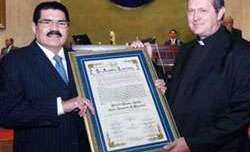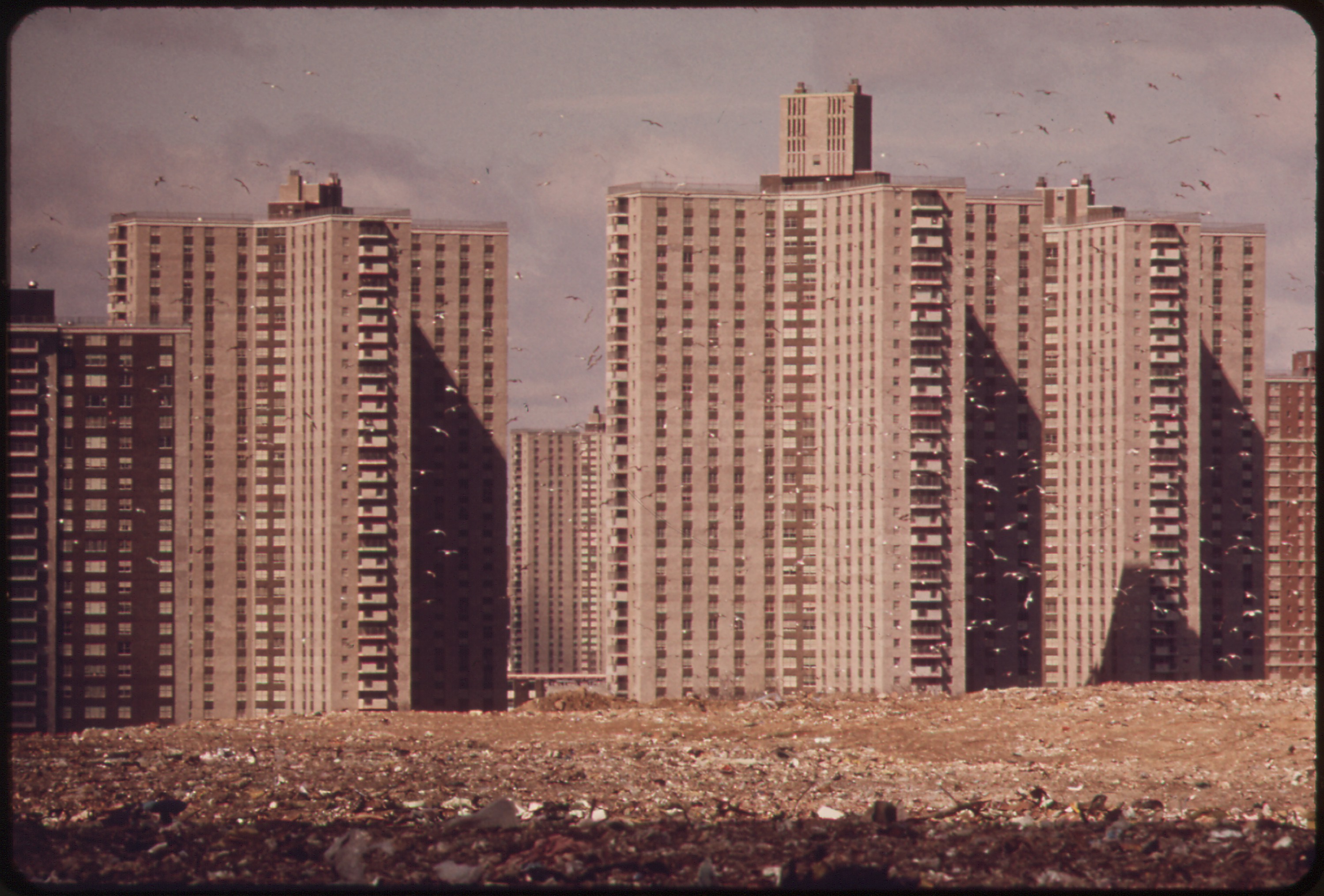Cowboy’s sins had multiplied and gone unforgiven for so long that he’d stopped believing they could be. Then came his jailhouse confession.
Ashes smudged on his forehead as a sign of repentance, Cowboy bent forward in his chair. The priest leaned in closer, the purple stole around his neck swaying slightly.
With hands sweating and lips trembling beneath a pencil thin mustache, Cowboy spoke. The words spilled out as if straight from the broken cup of his soul—the five felony convictions for heroin, 10 of his 40 years behind bars.
“I lived only to use,” he said of his addiction. “I been beat up, shot up, I’ve fallen from the top of a seven-storey building and I’m alive. But I don’t know why.”
He told of the nightmares his daughter, now 16, still has of what happened to her when she was three. The Latin music was playing loudly, and Cowboy was partying with family and friends on the roof of their Brooklyn tenement. When he tripped over the edge, his daughter heard him scream the whole way down. And then came the sound of flesh and bones breaking on the pavement below.
“There’s so many people I’ve hurt,” Cowboy continued. “I’ve had three wives, and I’ve got three kids. One’s 24; and the others are 16 and 10. I didn’t see ‘em grow up because I was always usin’. But they still love me; they never let me down, never said they’d had enough. My youngest daughter, she’s an altar girl in church.”
His voice clots as he tells of his two younger brothers, both dead of AIDS. Cowboy started them up on “junk,” and the three used to shoot up together.
“They looked up to me. They said they wanted to be just like me,” he said. “The last time I saw my brother was in the hospital, and he hugged me and said, ‘I love you, Cowboy.’ And then was dead.
“My mother, she’s young, not even 60,” he added. “But now she looks so old from all the stuff I put her through.”
They came from Puerto Rico and settled in the gang-ridden neighborhoods of the Bronx. They used to go to Mass every Sunday, a practice Cowboy had long since given up.
When he finished his litany of lives he has injured, Cowboy and the priest prayed from the Bible – Psalms 51 and the 34.
“My sin is ever before me … Create in me a clean heart, oh God,” Cowboy prayed as if he had written the words himself.
The priest told Cowboy that Jesus understands the many ways we can stumble and fall into sin, and that Jesus forgives those who are truly sorry and want to change. Then, pronouncing the sacramental words, he forgives Cowboy his trespasses in the name of Jesus.
As the priest spoke, Cowboy felt the weight of his accumulated sins rise up out of his chest; it seemed to float free in the pale moonlight, past the harsh searchlights’ glare, over the coils of razor- ibbon wire that top the tall electric fence.
“What a weird and lovely feeling,” Cowboy said afterward. “It was like something rushing out of me, but really slowly. Something was leaving me, and I felt something watching over me. I never wanted that sensation to end; I wanted that moment to last.”
Residents Encounter Christ
Cowboy’s confession was an unexpected drama in a unique retreat for prisoners called “Residents Encounter Christ” (REC). The Albany Diocese sponsors about ten REC weekends a year in four jails, using a rotating team made up of laymen and priests.
Through personal witness talks, small group activities, liturgies, and a Saturday night “hootenanny,” REC tries to lead prisoners to repentance and Christian living.
A recent REC weekend was held as Hale Creek, a jail in Johnstown, N.Y., for inmates in need of comprehensive alcohol and substance abuse treatment. Prisoners with addiction problems are sent there for the final six months of their sentence. There, they are put through a “shock camp” regimen aimed to teach sobriety and self-discipline in preparation for their reentry into the outside world.
Jesus said he came to preach liberty to those in chains, and he told his followers that he would always he present in those imprisoned—and that what we do unto the prisoner we do unto him.
But it is hard to see Christ in many of the inmates who make a REC weekend acknowledges Floyd Wakefield, a veteran of the retreats. “When I first started,” he explained, “I harbored mixed feelings: Did I have the forgiveness to accept these people for who they are?”
Indeed, some truly hard-to-like characters made the Hale Creek REC weekend:
There were young turks who swaggered and boasted of their drug dealing days. “I made $15,000 a day, and I was living easy, had a beautiful car and women,” said one.
There was “Captain Charity,” a petty thief and a con man who flashes a sliver crucifix like a badge and talks in big swoops of jive and insincerity. The last time he was released from jail, he was out 21 days before he broke his parole pledge to stay drug and alcohol free.
There were inmates who seemed to stare out with vacant, bleary eyes. When they spoke, it seemed not as if they were vile and depraved, but more as if they were empty inside. They were,, it seemed, souls for whom “the system” is the only imaginable way of life.
Hank, a Spanish Harlem resident who is serving three-to-five for robbery agreed. “Certain of these brothers, you see, they don’t wanna change,” he said. “They’ll be here for life. Oh sure, they’ll get out for a while; go back to their old ‘hoods and you know what they say, misery loves company. And they’ll wind up back here, but they really don’t mind, ‘cause they get three squares and a bed.”
Rap Sheets and Birth Certificates
Dostoyevsky, the Russian novelist who himself was jailed on death row, said, “The degree of civilization in a society can be judged by entering its prisons.”
The population at Hale Creek reflects a part of civilization that has been overwhelmed and broken by poverty, unemployment, violence, and drugs. For these people, a “rap sheet” seems like a routine addendum to their birth certificates.
Except for a handful, almost all of the 70 prisoners making the Hale Creek REC are black or Hispanic; there is a smattering of Asians. Most of hail from New York City neighborhoods legendary for indigence and vice, places like Bedford-Stuyvesant, Spanish Harlem, Brownsville and the Lower East Side.
“You seen that movie, ‘Return of the Zombies’? Well, man, 42nd Street where I come from, that’s what the people look like,” said Bertrand in a sweet voice that seems unlikely to come from a 6-foot-2-inch man built like a “V” wedge, with a thick neck and broad shoulders tapering powerfully into a small waist.
Asked about their hometowns, inmates described landscapes of pain—cramped walk-up apartments with crumbling ceilings, boarded up storefronts, empty lots, bits of broken glass everywhere, schools overcrowded with disorder and danger, and the familiar sounds of gunshots and sirens.
Most landed in jail because they were looking for fast money and easy living, pursuing the American dream promised by huge billboards that loomed over their neighborhoods and the teeming din of the TV that seemed to be on constantly in every home.
All but a few of the inmates are fathers and many have made mothers of more than one women.
“I was going to do what I normally did, which is rob apartments. My girl, she said, ‘Don’t go,’ I said I’d be right back. That was four years ago,” said Casanova, a skinny 30-year-old Polish Italian for the Lower East Side who is doing time for armed robbery. He left behind a female companion and a son who is now seven.
Growing up, his mother lived in a dark room, muttering insanely to herself, while his father was always drunk, shouting and beating him and his sister with a leather strap.
“He used to yell, ‘You’re eating too much. Look how much it costs to feed you!’” Casanova recalled. “And we only ate a little bit a couple times a day. Once he caught me giving a sandwich to my sister and he went down to hit me, but I just stared him down.”
Casanova was 14 when he left home for good, joining a Puerto Rican crime gang. He carries a birthmark from his life on the streets—a scar that forms a thick groove running from his right ear to nose. He got it in gang fight when he was clubbed and gouged by a baseball bat with large construction nails driven through the end of it.
“It’s hard to tell what is true and what isn’t in their stories,” said REC team member Fred Boehrer of the inmates’ hard-luck tales. “But in a sense, the ‘truth’ isn’t that important here. What they are telling is their story—how they’ve come to understand their lives and how they see the world they live in.”
The White Middle Class Goes to Jail
Boehrer, an adjunct theology teacher at Siena College in Loudonville, admits to having some reservations about a REC team made up mostly of middle-class whites going to jails to evangelize poor blacks and Hispanics. For him, the retreat does not confront sufficiently the connections among racism, poverty, and crime.
With more than one million people locked up in American jails—half of whom are black when the total U.S. population is only12 percent black—Boehrer questions whether REC isn’t just abetting a society that tries to solve its problems by building more prisons. But for all its contradictions, he looked on the REC retreat as an important expression of the Church’s “ministry of presence” to society’s forgotten oppressed.
There are moments during the weekend when the walls that divide suburban Albany from inner-city New York are broken so down. In prepared talks that have the favor of an Alcoholics Anonymous meeting, REC team members reveal that they, too, have suffered from and contributed to abusive homes, marital infidelity, runaway youths, and addiction. They related their hardships to the Christian promise of forgiveness and the possibility of redemption, and they urge the imprisoned to do the same.
The REC message is standard retreat fare—the “old self” with its sinful ways must die; God’s forgiveness and reconciliation must be sought; “new life” can be found in loving service to Christ and others.
It is never to late for the Prodigal Son to be changed into the Good Samaritan, the REC weekend teaches.
That message struck a cord with Ferdinand, graffiti artist, dope fiend and thief. As a child in Phillippines, he used to scour the garbage dumps for metal scraps which he would sell for food. To get clean water for cooking and drinking he would have to walk two miles carrying a 60-gallon water drum.
Though his family moved to America when he was 11, the better life they were seeking never materialized. He always found himself on the wrong side of the poverty line and the law. While praying to St. Jude in jail one night, he said, he rediscovered his Catholic faith.
“God has always been there for me. It wasn’t Him that left me; it was me that left Him. I hope He’ll take me back,” Ferdinand said. “I called my grandmother. I told her I want to join her church when I get out.”
“It’s an odd thing, but for a lot of the guys, it’s their grandmother who they really feel close to,” said REC member Wakefield. “It seems like the grandmother was the one who held the family together, the one person who was the stable presence in their lives.”
Seeking the love, trust and sense of family they had never had at home, many of the inmates at Hale Creek turned to the camaraderie of gangs or the delusion of drugs.
Recycled Garbage
“Most of the guys feel like they’re garbage,” said team member Harry Brust. “What I try to do is tell them that they may be garbage now, but they can be recycled garbage.”
Brust, a 55-year-old grandfather, has devoted his retirement years to volunteer prison ministry. Among REC members, it is his life that seems to resonate the most with inmates.
“I never wore the greens, but I should have,” he said, referring to the garments worn by prisoners. “I know what it’s like to wear green on the inside. I never liked myself. I felt I was ugly. I had a speech impediment, like I wasn’t smart, I never had more than an 8th-grade education.”
With his white stubble beard, broken teeth and weathered skin, Brust’s face is like a road map of his rough and tumble past as a barroom prizefighter, bodyguard, and drunkard. While working at the now defunct Ford Motor Company factory in Green Island, he had a life-changing encounter with the Lord.
“My boss always hated me. He was always bothering me, harassing,” he said. “One day, I really wanted to be his brains in, and I was ready to do it. I got scared. I never really felt like killing somebody before. So I prayed the Lord’s Prayer maybe 15 pr 16 times, over and over. Then I was thrown to the ground by the Lord. He struck me down right there in the factory. When I got I up I felt like I was fresh snow, like the snow looks like it fell on the ground and nobody ever tracked on it. I felt so fresh and clean.”
Since the experience, Brust has been on the team for nearly 20 REC weekends. He spends several days a week administering to inmates in prisons across the state. He tells them that even though he is “not much of a reader” he listens to tape recordings of the Scripture at least four of five hours a day.
“It’s 18 inches from your head to your heart,” Brust exhorts the inmates. “You gotta get your faith outta your head and into your head. You gotta take Jesus off the cross and make him a real person and a friend. You can’t hate yourself of blame other people for the way you are anymore. You can make a change but it’s not gonna be easy; you’re going to have to give things up.”
The REC weekend points up the evident tension between REC’s liberating message of self-worth and the often-degrading realities of prison life. It is a tension that is built into the very way society views the function of prisons. America wants prisons that punish as well as reform wrongdoers.
The REC message of God’s special love for each person has to penetrate persons hardened by the uniform depersonalization of prison life, persons garbed in anonymous “greens” and identified by two numbers – a prisoner number and a bed number.
Some inmates complain that they face scorn from some guards when they try to better themselves by learning new skills or taking their faith seriously.
Indeed, during the recent Hale Creek weekend, one guard, a plump, ruddy-faced man with little eyes, ridiculed inmates for “trying to get saved.” During the Mass celebrated with inmates, this guard smoked and talked loudly on the phone as if to display his contempt for the proceedings.
On the other hand, Corrections Officer Angel Rodriguez gave an impromptu exhortation during the retreat, relating to the prisoners how it was a priest that helped save him from a life on the streets.
“We in society, and a lot of us in prison, have a stereotype. We think of criminals in a certain way; basically, we hate criminals,” Rodriguez said after afterwards. “But these are brothers and sisters and cousins. As a society, we’re between the rock and the hard place. These people are going back out into society; we got to try to do something for them.”
He acknowledges that they odds are not good for many. Most leave prison as they came in—with no money and no job, with only a bus ticket back to old neighborhoods were unemployment rates are high and the index of hopelessness even higher.
What role can REC play for prisoners facing these odds? Team member Al Turo describes REC in terms akin to the old idea of “penitentiary”—a space where criminals can become “penitents,” reflecting on their sins discovering their need for forgiveness and reconciliation.
“I’m praying so hard for forgiveness, but I’m having a hard time of it,” confessed Robbie, a 34-year-old former local basketball star who played ball professionally in Europe before acquiring a crack cocaine habit and robbing a bank in New York. He is overcome with guilt for the death of his brother, who was murdered, shot three times in the head, in a crack den in Washington. Robbie turned his brother on to crack, and feels responsible for his death and the anguish of his mother.
“I lived in that devilish underworld,” he said. “I was afraid to come out and walk in the daylight. I was like an image of myself, or a shadow, standing outside myself looking at a strange person.”
The Residents Encounter Christ program tries to set prisoners free from the underworld of sin and crime by scattering seeds of love and forgiveness that may one day take root in a criminal’s heart.
“I feel love, man,” said the inmate Bertrand near the end of the retreat. “I haven’t had no one hug me and tell me they loved me in I don’t know how long. I think this must be the Lord. And I feel like I want to do the same thing—to love the people I used to hurt.”
Originally published in The Evangelist (September 9, 1993)
© David Scott, 2009. All rights reserved.


